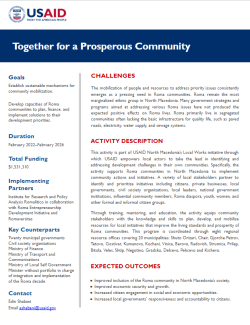CHALLENGES
The mobilization of people and resources to address priority issues consistently emerges as a pressing need in Roma communities. Roma remain the most marginalized ethnic group in North Macedonia. Many government strategies and programs aimed at addressing various Roma issues have not produced the expected positive effects on Roma lives. Roma primarily live in segregated communities often lacking the basic infrastructure for quality life, such as paved roads, electricity, water supply, and sewage systems.
ACTIVITY DESCRIPTION
This activity is part of USAID North Macedonia’s Local Works initiative through which USAID empowers local actors to take the lead in identifying and addressing development challenges in their own communities. Specifically, the activity supports Roma communities in North Macedonia to implement community actions and initiatives. A variety of local stakeholders partner to identify and prioritize initiatives including citizens, private businesses, local governments, civil society organizations, local leaders, national government institutions, influential community members, Roma diaspora, youth, women, and other formal and informal citizen groups.
Through training, mentoring, and education, the activity equips community stakeholders with the knowledge and skills to plan, develop, and mobilize resources for local initiatives that improve the living standards and prosperity of Roma communities. This program is coordinated through eight regional resource offices covering 20 municipalities: Shuto Orizari, Chair, Gjorche Petrov, Tetovo, Gostivar, Kumanovo, Kochani, Vinica, Berovo, Radovish, Strumica, Prilep, Bitola, Veles, Shtip, Negotino, Gradsko, Delcevo, Pehcevo and Kichevo.
EXPECTED OUTCOMES
- Improved inclusion of the Roma community in North Macedonia’s society.
- Improved economic security and growth.
- Increased citizen engagement in social and economic opportunities.
- Increased local governments’ responsiveness and accountability to citizens.

